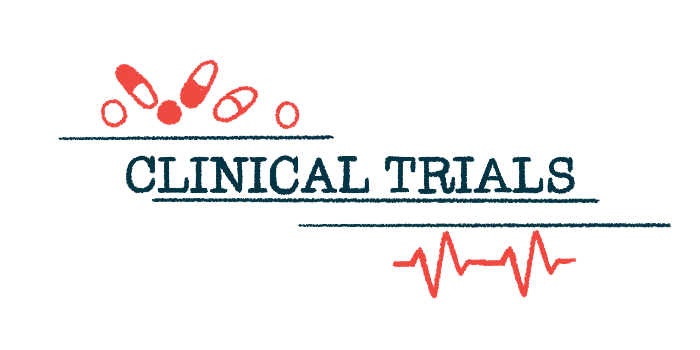Navenibart continues to reduce HAE attacks in long-term trial
Treatment every 3 to 6 months reduced attack rate by 92% over 10 months
Written by |

Navenibart, an experimental treatment from Astria Therapeutics to prevent swelling episodes in people with hereditary angioedema (HAE), continues to show strong and sustained benefits in a long-term clinical trial.
New data from the ALPHA-SOLAR Phase 2 (NCT06007677) open-label extension study show treatment with navenibart every three to six months reduced the monthly rate of HAE attacks by a mean of 92% over 10.1 months of follow-up. The reduction was even greater for more severe attacks and those requiring on-demand treatment.
The treatment was well tolerated with no serious treatment-related side effects or discontinuations reported.
These findings were presented at the European Academy of Allergy and Clinical Immunology Annual Congress, held this month in Glasgow, Scotland, in a poster titled “Long-term Safety and Efficacy of Navenibart in Participants with Hereditary Angioedema (HAE): Initial Combined Results from ALPHA-STAR and ALPHA-SOLAR.”
ALPHA-ORBIT enrolling in US, Canada
The company is now running a Phase 3 clinical trial, called ALPHA-ORBIT trial (NCT06842823), to further evaluate the every-three-month and every-six-month dosing regimens in people, 12 years and older, with HAE type 1 or 2, which are caused by mutations that result in a deficiency of the C1 esterase inhibitor (C1-INH) protein. Enrollment is ongoing for an estimated total of 145 participants at sites in the U.S. and Canada.
“The navenibart results in patients to date support the potential for patients to have long-acting protection from their HAE attacks with very low treatment burden,” William Yang, MD, chair at Ottawa Allergy Research Corporation and Red Maple Trials, said in a press release from Astria. “We are excited for the Phase 3 ALPHA-ORBIT trial and believe that navenibart’s profile with infrequent dosing could allow patients to spend less time thinking about their HAE, and more time living their lives.”
Navenibart is an antibody-based therapy designed to block the activity of kallikrein, which is normally controlled by C1-INH but becomes overactive in HAE. This results in the excessive production of bradykinin, a protein that causes blood vessels to widen and become more permeable, which allows fluid to leak into nearby tissues.
By inhibiting kallikrein, the therapy is expected to lower bradykinin levels, which should help prevent swelling episodes.
Navenibart was tested in a Phase 1b/2 trial called ALPHA-STAR (NCT05695248), where a total of 16 HAE type 1 and 2 patients received three distinct dosing regimens — a single 450 mg injection; an initial 600 mg injection, followed by a second 300 mg injection three months later; and two 600 mg injections, one month apart.
Results showed the treatment was safe and well tolerated and reduced the rate of monthly swelling attacks by more than 90% over six months.
After completing the main trial, all patients entered the ALPHA-SOLAR open-label extension, which will assess long-term treatment for up to four years. Those in the first two groups received an initial dose of 600 mg and then 300 mg every three months, while the third was given an initial dose of 600 mg, followed by a second 600 mg dose after 28 days, and then 600 mg every six months.
Researchers have now reported data gathered over a mean follow-up of 17.4 months across the ALPHA-STAR and ALPHA-SOLAR trials, and 10.1 months in ALPHA-SOLAR alone.
Rate of monthly attacks more greatly reduced with dosing every 3 months
The treatment continued to be well tolerated, with no serious treatment-related side effects or discontinuations. The most common adverse events related to navenibart were injection site reactions.
During ALPHA-SOLAR, the mean rate of monthly HAE attacks was 92% lower than in the eight weeks leading up to the ALPHA-STAR trial (baseline) — 0.17 attacks per month vs. 2.22 attacks per month during the baseline period. While reductions were high in both groups, participants on the every-three-month regimen experienced a 95% reduction in monthly attack rates, compared with an 86% reduction in those given treatment every six months.
In the whole population, the monthly rate of moderate and severe attacks was reduced by 95% and the monthly rate of attacks requiring on-demand treatment decreased by 92%. Again, reductions were particularly higher in the group receiving navenibart once every three months.
“We are thrilled to share positive initial results from the ALPHA-SOLAR long-term open-label trial,” said Christopher Morabito, MD, chief medical officer at Astria. “Results are consistent with navenibart’s best-in-class profile that we saw in the ALPHA-STAR Phase 1b/2 trial,” and “support navenibart’s favorable profile and the potential to administer navenibart every 3 and every 6 months.”
Navenibart has received orphan drug status for HAE in the U.S. and Europe. These designations provide incentives to companies developing treatments for rare diseases, including several years of market exclusivity if the therapy is ultimately approved.



